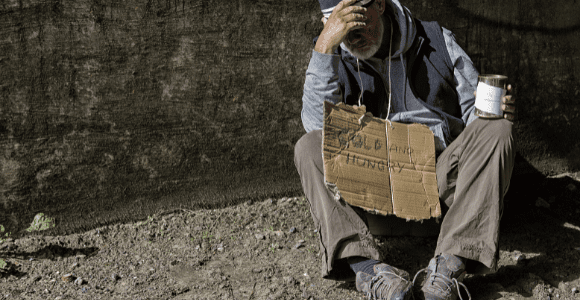Welcome readers! Please subscribe through the button on the right.
(Read this series from the beginning at Part 1 and Part 2.)

Some of the most progressive, historical Jesus scholars see in this story a reflection of actual deeds the historical Jesus did. Jericho, where this story happens, was the last stop before the Temple State’s capital, Jerusalem, and there’s an economic thread to this story as well. As I said earlier, Jesus is on his way to Jerusalem to flip the tables of an economic, social, political and religious system that privileges a few at the expense of many.
Jesus meets Bartimaeus at what would have been a popular location for Jericho’s beggars to gather. With the holiday coming up, many people would making a pilgrimage to Jerusalem to celebrate. The holiday would have put them in the spirit of giving, and their tithes and offerings would have given them the means to give to so many of the begging people.
Bartimaeus’ name in this narrative also holds meaning. It could mean either “son of him who is honored or highly prized” or “son of the unclean or uncleanness.” In this story, he is both.
This story offers a repeated theme within the gospels: the crowd obstructs Bartimaeus’ attempts to get at Jesus and Bartimaeus’ increased efforts in response. I think of women pastors who belong to religious traditions that oppose women’s ordination, and how much harder they must work to follow their calling. I think of how hard people of color have to work to survive within historically White churches. And I think of the deep homophobia, biphobia, and transphobia present in most of Christianity still today, and how my LGBTQ friends who love and follow Jesus must work to stay in their faith traditions, even on the edges. Then and now, the crowd closest to Jesus is often the biggest obstacle to those on the margins of society who desire an audience with him.
I also love how our story has the poor beggar Bartimaeus “throwing his cloak aside” when he is finally able to get up and go to Jesus. This cloak, which would have been his only one, was also his most prized trade tool. He would have spread out his cloak to collect coins from those passing by: it was his own meager means to get his small livelihood, and he just tosses it aside. Consider the rich man in the last chapter who was called to make reparations and couldn’t let go of anything.
Jesus asks Bartimaeus the same question he had asked of James and John:
“What do you want me to do for you?” (Mark 10:51 cf. Mark 10:36)
The disciples wanted Jesus to grant them positions of privilege and honor in their own erroneous definitions of what the reign of God would look like. They assumed the reign of God would still mean privilege some at the expense of others.
But Bartimaeus is not asking to be made greater than others. He’s asking to be placed on the same level ground with others in an ableist society that economically, socially, religiously, and politically evaluates him as “last.” He just wants to see. So many disenfranchised and underprivileged people just want to be able to live and thrive on the same level ground as those who are privileged in our present system. For my LGBTQ friends, LGBTQ Pride month doesn’t mean they desire to be better than others: pride for them is the opposite of shame, not the opposite of humility. It is to celebrate being of equal worth to everyone else in a world that continually strives to make you feel inferior.
Bartimaeus just wants to see, and experience all that his sight would enable him to have in his society.
I’m glad the story doesn’t end with Jesus just giving him the ability to see. That wouldn’t go far enough. Fortunately the story doesn’t end with “Immediately he received his sight.” It ends with “Immediately he received his sight and followed Jesus along the road.”
What road was it that Bartimaeus joined Jesus on?
The road to Jerusalem.
That road ended in a temple courtyard with the tables of money changers being overturned. It ended in actions that so threatened the system that they landed Jesus on a Roman cross with other political rebels within the week.
What’s my takeaway from this story?
On our way to creating another world, we are to engage in damage mitigation. While we are working toward a world that a safe, compassionate, just home for everyone, we are to work to mitigate damage that our present world is doing by not being just, or safe, or compassionate for everyone. And yet, damage mitigation isn’t enough.
It’s not enough to remove the basis for people being treated as less-than. We must also challenge the very systems the create less-thans and greater-thans. Jesus didn’t just give Bartimaeus his sight. He continued on the road to challenge a system that made a blind man a beggar to begin with.
And we must do the same.













